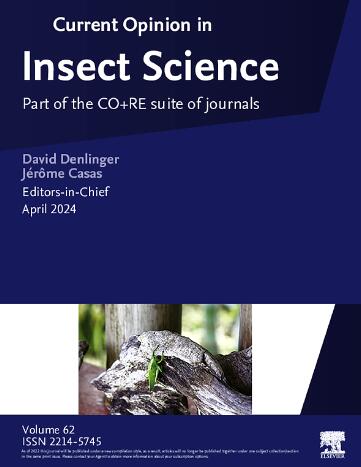害虫都去哪儿了?了解淡季作物病虫害动态的基因组机制。
IF 4.8
1区 农林科学
Q1 BIOLOGY
引用次数: 0
摘要
农业生态系统为昆虫提供了丰富的资源。然而,在整个淡季,昆虫必须克服资源短缺和不利的气候才能生存。这种淡季的持久性影响了随后的作物或季节的害虫侵扰。主要害虫种类通过滞育、迁徙和局部扩散在淡季持续存在。基因组学方法提高了我们对这些生存机制的理解。时钟基因调节昼夜节律,并与神经肽和下游途径相互作用,如胰岛素样肽和调节滞育的激素因子,如表皮甾体和幼年激素。迁徙的昆虫必须管理能量代谢、产卵和飞行方向等过程。局部范围的扩散需要找到、选择和利用最合适的宿主和栖息地,以便在淡季生存和繁殖。在这里,我们介绍了害虫在淡季生存的基因组研究进展,重点是滞育、迁徙和局部尺度的分散。了解这些现象对于制定和优化有效的害虫综合管理方案至关重要。本文章由计算机程序翻译,如有差异,请以英文原文为准。
Where do all the pests go? Understanding the genomic mechanisms of crop pest dynamics during the off-season
Agroecosystems provide abundant resources to insects. However, throughout the off-season, insects must overcome resource shortages and adverse climates to survive. This off-season persistence affects pest infestations in subsequent crops or seasons. Key pest species employ diapause, migration, and local-scale dispersal to persist during the off-season. Genomic approaches have advanced our understanding of these survival mechanisms. Clock genes regulate the circadian rhythm and interact with neuropeptides and downstream pathways, such as insulin-like peptides and hormonal factors–like ecdysteroids and juvenile hormones that regulate diapause. Migrant insects must manage processes like energy metabolism, oogenesis, and flight orientation. Local-scale dispersal requires mechanisms to locate, select, and exploit the most suitable host and habitat for survival and reproduction during the off-season. Here, we present advances in genomic research on pest survival during the off-season, focusing on diapause, migration, and local-scale dispersion. Understanding these phenomena is crucial for developing and optimizing effective integrated pest management programs.
求助全文
通过发布文献求助,成功后即可免费获取论文全文。
去求助
来源期刊

Current opinion in insect science
BIOLOGYECOLOGYENTOMOLOGY-ECOLOGY
CiteScore
10.40
自引率
1.90%
发文量
113
期刊介绍:
Current Opinion in Insect Science is a new systematic review journal that aims to provide specialists with a unique and educational platform to keep up–to–date with the expanding volume of information published in the field of Insect Science. As this is such a broad discipline, we have determined themed sections each of which is reviewed once a year.
The following 11 areas are covered by Current Opinion in Insect Science.
-Ecology
-Insect genomics
-Global Change Biology
-Molecular Physiology (Including Immunity)
-Pests and Resistance
-Parasites, Parasitoids and Biological Control
-Behavioural Ecology
-Development and Regulation
-Social Insects
-Neuroscience
-Vectors and Medical and Veterinary Entomology
There is also a section that changes every year to reflect hot topics in the field.
Section Editors, who are major authorities in their area, are appointed by the Editors of the journal. They divide their section into a number of topics, ensuring that the field is comprehensively covered and that all issues of current importance are emphasized. Section Editors commission articles from leading scientists on each topic that they have selected and the commissioned authors write short review articles in which they present recent developments in their subject, emphasizing the aspects that, in their opinion, are most important. In addition, they provide short annotations to the papers that they consider to be most interesting from all those published in their topic over the previous year.
 求助内容:
求助内容: 应助结果提醒方式:
应助结果提醒方式:


